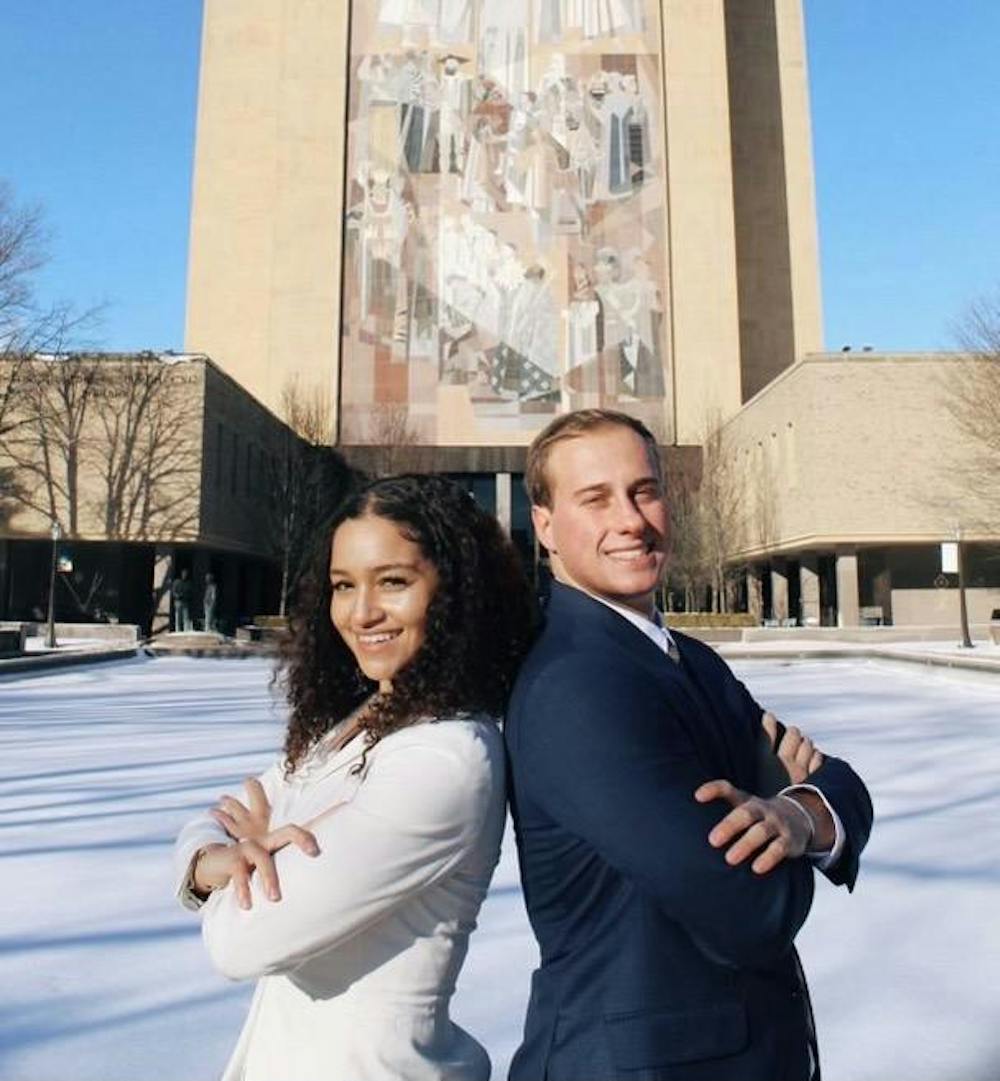Sophomore Gerald (Jerry) Vielhauer and junior Sonia Lumley are running unopposed in today’s student body president and vice president election. This is the first instance of a student government ticket running unopposed since 2012, and only the second time in the history of Notre Dame’s student government.
In an interview with The Observer, Vielhauer and Lumley expressed their long-held goal to run for the highest political office in student government. The pair met through a mutual student government friend after expressing interest in running. They credit their experience with Notre Dame’s community as the motivation for running — and giving back to the campus which has given so much to them.
Originally from Syracuse, New York, Vielhauer is majoring in political science with minors in constitutional studies, business economics and philosophy. Lumley, from Merced, California, is another political science major with a minor in the Hesburgh program in public service.
Vielhauer, who tops the ticket as the presidential candidate, emphasized he is “all about Christian leadership, servant leadership” and stressed his love for the Notre Dame community.
“[During] admitted student days, when I stepped in the Basilica, it was just like a surreal experience. I didn't want to leave, and so I was blessed enough to be accepted,” he said.
Lumley echoed her running mate’s sentiment.
“Notre Dame has given me so much, and I feel like this is the highest place to give back to our community,” she said.
The ticket’s platform, published on their Instagram, highlights campus dining improvements, student-athlete relations and mental health programming. Both pointed to their previous experience in student government — Vielhauer is the sophomore class vice president — as formative to their priorities for the upcoming term.
“It's been a blessing to be able to meet so many people in student government in my first couple years of being in Class Council and do that experience,” Vielhauer said. “I've met a lot of people who this was something they're interested in and kind of built relationships and friendships with them.”
Vielhauer stressed upholding the Catholic character of the University would be an integral part of his and Lumley’s administration.
“Our Catholic identity is a huge part of what Notre Dame … That's something that I want to always be cognizant of and always be thinking of every time we do any measure of policy or programming,” Vielhauer said. “I think that we really are excited to kind of unite campus around our Catholic mission, our Catholic values, and at the same time still being welcoming to everyone.”
As part of their Irish health plan, Vielhauer and Lumley want to advocate for expanded meal plan options for on-campus students, with more variation than just the Block 250 and Block 230 plans currently available to undergraduates. They propose “healthier options at the dining halls,” especially for allergy groups.
Lumley pointed to her own difficulties eating at the dining while being lactose intolerant and gluten-free.
“A lot of those options are not in the dining hall,” she said. “So being able to have a voice for those groups of people as well that I represent would be great.”
The ticket also proposes increasing resources for the University Counseling Center, adding more weightlifting equipment in Rockne Memorial and upgrading AC and laundry facilities in the dorms. The pair devoted a significant portion of their platform to “student-athlete relations,” which they aim to improve through the creation of a new executive cabinet department devoted to the needs of student athletes.
“I feel that sometimes, with student athletes making up such a large portion of our campus, their concerns fall on deaf ears, and I really want to help get them to be more a part of student government,” Vielhauer said.
Lumley also proposed increasing support for first-generation students who are moving to college alone as part of their FGLI initiative.
On the rarity of a one-ticket election, Vielhauer suggested that student government is especially unified. Lumley pointed to a shorter winter break, giving potential candidates less time to prepare.
“I think they probably weren't thinking about it too much. They were probably thinking about the national championship,” Lumley said.
Vielhauer recognized complaints by some students that student government candidates are sometimes unable to deliver on their promises.
“I definitely would say that most of those policy platforms that you see year by year, they don't end up happening. And that is the thing that is very frustrating for a lot of students … that the majority of those things, or maybe 50% of those things, don't end up happening,” he said. “But I think that we can look and see the hope in those little things happening and those little changes over time that can ultimately become a lot.”
The pair pointed to the addition of spice stations in the dining halls, as well as the expansion of dorm gym equipment as examples of tangible student government achievements in recent years. When it comes to implementing the ideas they have, the two stressed the importance of listening to the concerns of students and advocating them to administrators.
“At the end of the day, while we can't force administration stands, I think that they really do want to work with us to help the student body,” Vielhauer said. “And when we have the right people in place, we can really do a lot for the student body.”










